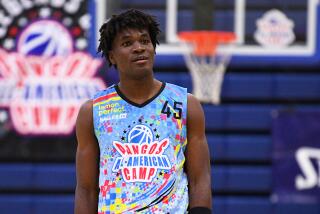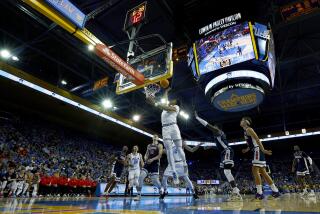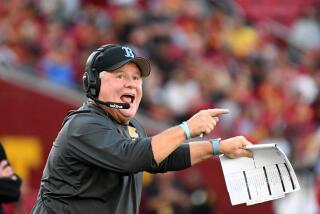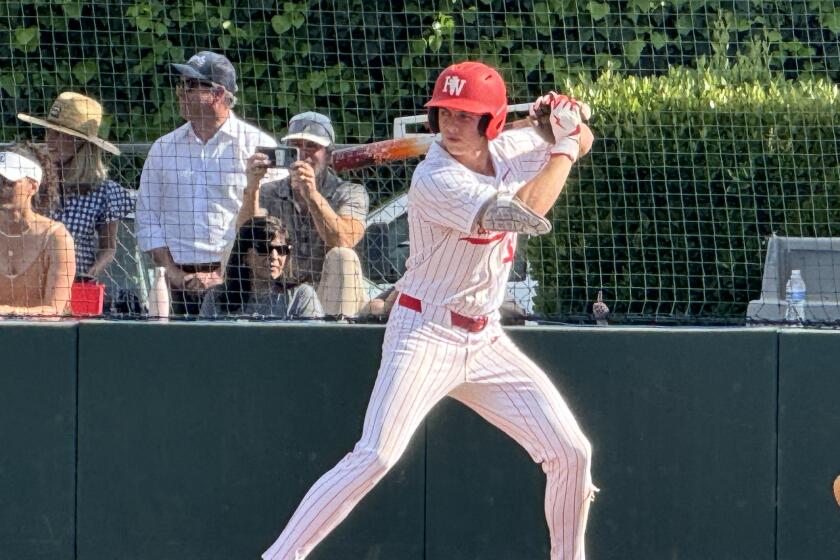Column: Academic success becomes a road to college for coach Derek Benton and players at Angelou High
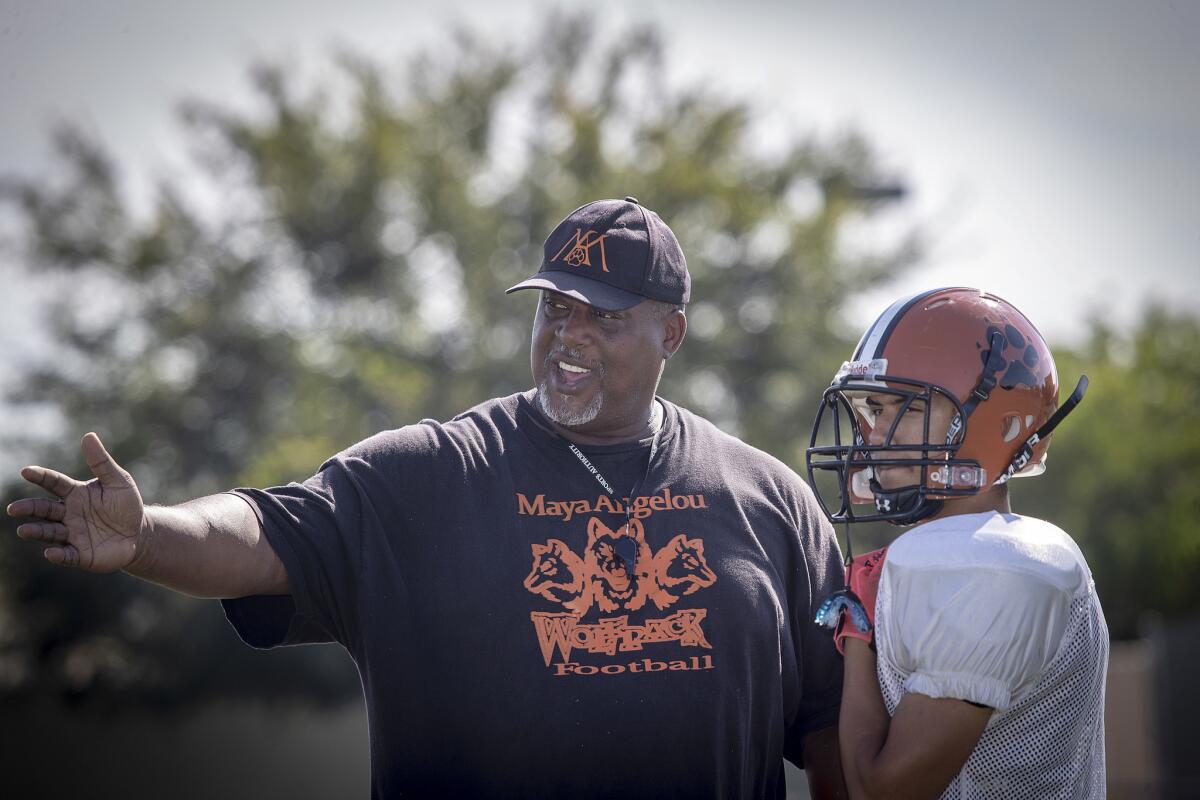
Wearing an orange T-shirt, black shorts and black shoes, Derek Benton looks as if he’s headed on a trip to the airport as he rolls his portable suitcase along the concrete at Angelou High School.
With a gray goatee and thick torso, Benton is walking briskly while carrying a piece of paper in his right hand as a whistle dangles around his neck.
It’s just another hectic day in the life of a City Section football coach.
At a time where the gap between the haves and have-nots in high school football continues to widen, Benton and tiny Angelou in South Los Angeles have discovered motivation, inspiration and, perhaps, a winning formula thanks to the example set by quarterback Nelson Gonzalez and running back Joshua Fuqua, both of whom graduated last June.
Gonzalez and Fuqua ended up at USC and UCLA, respectively, on academic scholarships. Gonzalez, the class valedictorian, began classes at USC last week thanks to school grants and outside scholarships. Fuqua, who ranked No. 3 in the class, starts at UCLA on Sept. 25.
No football team in Southern California can say that their quarterback and running back ended up at those two schools without an athletic scholarship.
UCLA and USC share a No. 21 ranking on U.S. News & World Report’s 2017-18 rankings of the best colleges. USC’s estimated cost for 2018-19 in tuition and fees is $55,320; UCLA is at $13,225 for California students.
“It’s not easy to get into those two schools,” Gonzalez said. “You have to respect we got into two of the most prestigious schools in the country.”
Neither will be playing football in college. Gonzalez was a 5-foot-6, 141-pound starting quarterback. Fuqua came out for the team in his senior year after being recruited by Gonzalez.
“It was one of the best experiences of my life playing football,” Fuqua said. “I loved it.”
Angelou, named after the late poet Maya Angelou, opened in 2012 as part of an expansion in the Los Angeles Unified School District. It didn’t win a football game until 2015, Benton’s first season as coach. From the beginning, though, he has embraced a higher priority than win-loss record.
“I told the parents we may not ever produce an NFL kid,” he said. “We may not produce a DI or DII kid — it might be DIII or NAIA. But what I can guarantee is your kid will get an education and most importantly, they’ll be productive in the community, they’ll have character, life skills and they’ll be a great addition to society on the academic side if they just allow them to be part of the Wolfpack program.”
At a time of dwindling numbers in football, Benton may be on to something. For all the money parents spend on camps, private lessons and moving to have their son or daughter play for a high-profile team, perhaps investing a little bit more on the academic side can lead to the same goal — a college scholarship.
There is a much larger pool of money for students to land financial aid for academics than earn an athletic scholarship. More than $45 billion in scholarships, grants and aid are awarded annually by the U.S. Department of Education, colleges and universities in America, according to debt.org, while nearly $3 billion in athletic scholarships are provided by Division I and II schools, according to the NCAA.
Principal Hugh Carlos, who grew up in the area, endorses Benton’s approach and appreciates the example set by Gonzalez and Fuqua.
“We’re trying to focus on character and academics,” he said. “We’re proud of them. They’re going to be role models that you can be a scholar first.”
Gonzalez grew up in South L.A., the middle of six children. His parents are from El Salvador. He had a 4.3 grade-point average with dreams of being an aerospace engineer. He was so small that it was hard seeing over the offensive line. He didn’t waver.
“It was pretty difficult but I knew I could face the challenge,” he said. “I knew through hard work and dedication you could do anything. Through studying, you can overcome it and break the stereotype. It was a fun experience.“
Fuqua, whose father was in the Marines, worked two jobs this summer preparing for school. He didn’t know how to put on shoulder pads or even how to run when he tried football for the first time last year.
“I was a mess,” he said.
He rushed for 444 yards and two touchdowns during a 2-8 season.
“I’m grateful for it,” he said.
He wants to become a therapist or counselor and said he learned much from playing football.
“It showed me you need everyone to do your job to be successful,” he said. “If one messes up, then we all mess up as a whole. It’s OK to dream but you need to know when you have to be an adult and prepare for the future.”
Angelou’s starting quarterback this season, Angel Lopez, said Gonzalez and Fuqua are not forgotten.
“It’s very inspiring,” he said. “I always knew there’s a lot of ways to get to college, but seeing them proves it to me.”
And just wait until the two are cheering against each other in the stands during the USC-UCLA football game.
“We’re going to beat them,” Fuqua said.
“SC football is too good to be beaten by UCLA,” Gonzalez said.
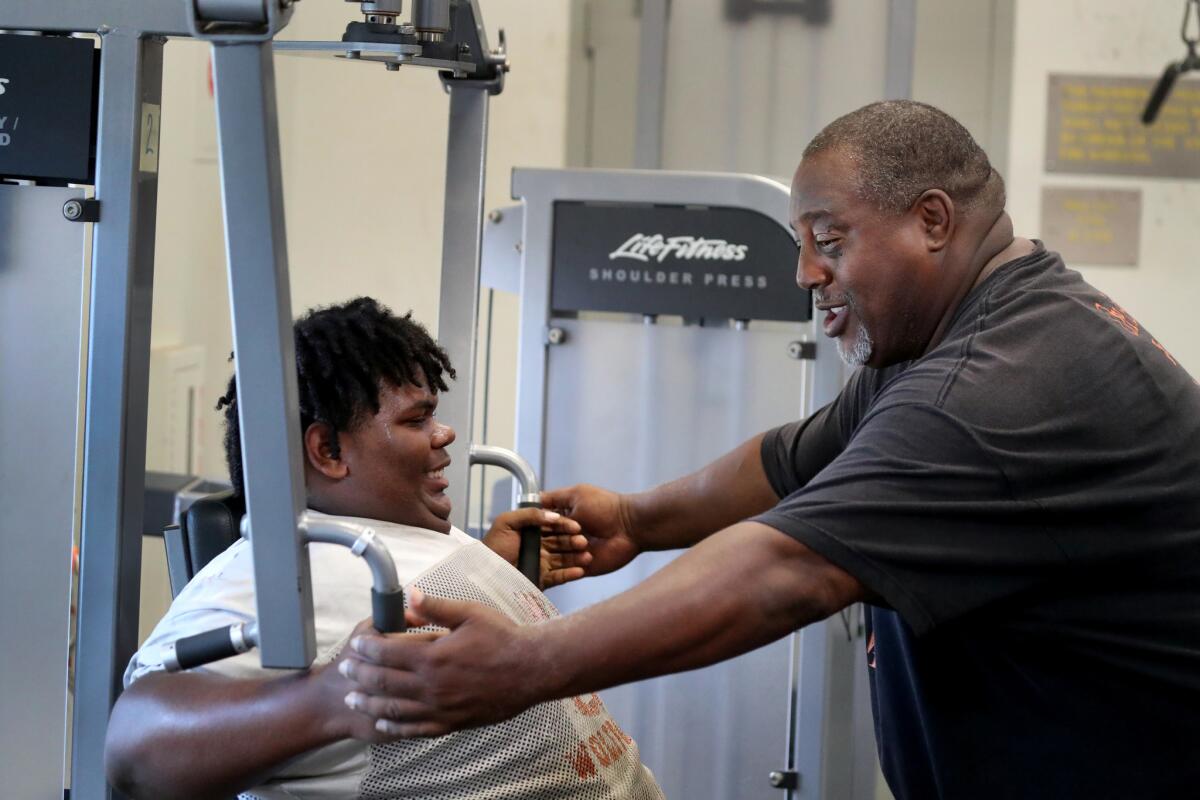
Benton, 58, went to Inglewood High. He started a private business helping developmentally challenged kids, then retired to become a coach.
“When he came, he changed the culture of the school,” Gonzalez said. “He helped balance academics and athletics. Even though he wanted you to be practicing and playing, he was always OK if you went to a tutor.”
The legacy created by Gonzalez and Fuqua is something Benton hopes to build on. The Wolfpack are 1-1 this season with 31 students in the program. Benton’s duties are never ending.
In the weight room earlier this summer, with a cellphone in one hand and an empty athletic bag in the other, Benton was doing what every City Section coach does — trying to make sure players are eligible to play.
“You turned in all your stuff?’’ he asked one of his players in the middle of a lifting session.
Then he walked to another player to offer a pep talk.
“This should be my sophomore starting quarterback, but he doesn’t believe in himself,” he said. “He has all the skills and all the smarts.”
Coach, mentor, tutor, counselor, psychologist, disciplinarian, equipment manager — just another day in the life of a City Section football coach.
Twitter: @latsondheimer
More to Read
Get our high school sports newsletter
Prep Rally is devoted to the SoCal high school sports experience, bringing you scores, stories and a behind-the-scenes look at what makes prep sports so popular.
You may occasionally receive promotional content from the Los Angeles Times.

